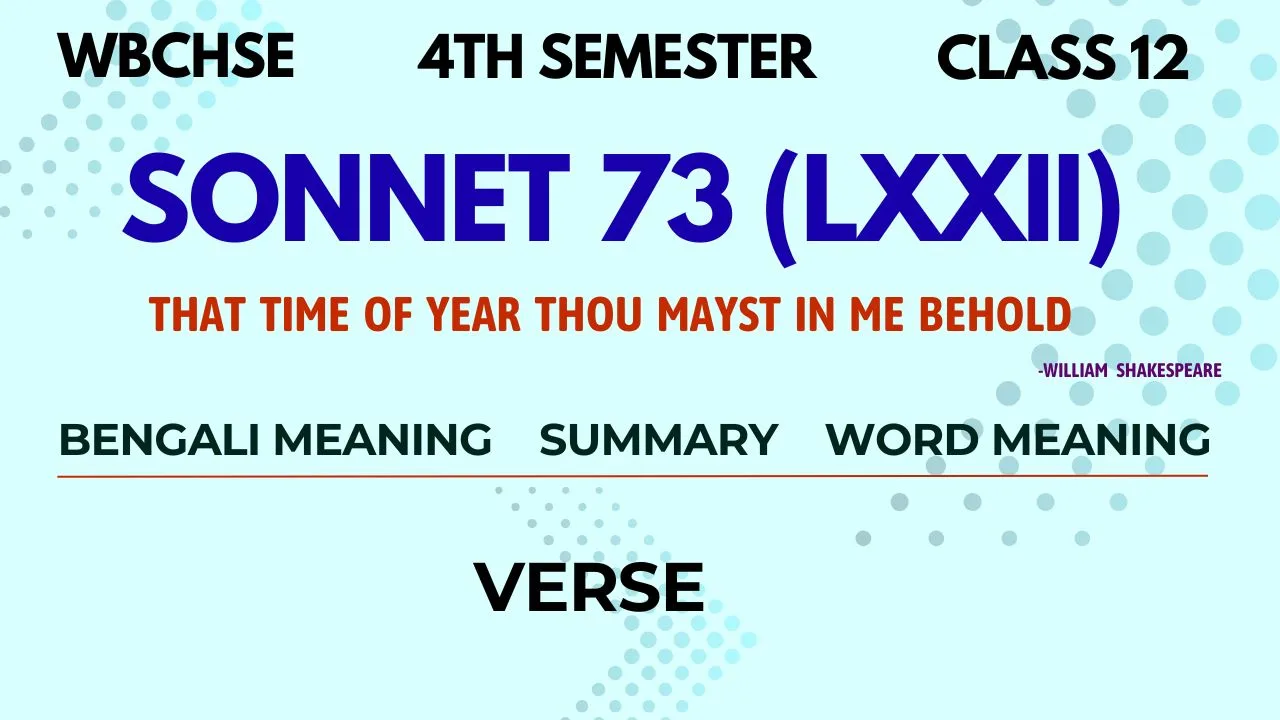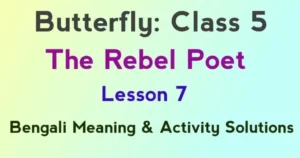Explore Sonnet 73 Summary and Bengali Meaning WBCHSE for Class 12, 4th Semester students. Understand Shakespeare’s thoughts on old age, mortality, and the passage of time through vivid images of autumn, twilight, and a dying fire. Learn the poem’s meaning in Bengali to enhance comprehension and exam preparation.
About the Poet:
William Shakespeare (1564–1616) was an English poet, playwright, and actor, often considered the greatest writer in the English language. He wrote 39 plays, 154 sonnets, and two long narrative poems. Known as the “Bard of Avon,” Shakespeare dealt with universal themes such as love, power, fate, and human nature. His works have left a lasting influence on literature and the arts, and his legacy remains unmatched even today.
Substance of the Poem (Sonnet 73)
In Sonnet 73, Shakespeare reflects on old age and the closeness of death. He uses three powerful images from nature and life. First, he compares himself to late autumn, when trees are almost bare, and birds no longer sing. Then, he compares his life to twilight, the fading light of day that is soon covered by night, a symbol of death. Finally, he sees himself as a dying fire, resting on the ashes of youth, slowly burning out. These images show that his life is nearing its end.
The poet finally says that this awareness of death makes love stronger. When we know that something will not last forever, we value it more deeply. Thus, Shakespeare teaches that the shortness of life should not cause despair, but should make human love more precious and intense.
(‘সনেট ৭৩’-এ শেক্সপিয়র বার্ধক্য ও মৃত্যুর নিকটতা নিয়ে ভাবনা প্রকাশ করেছেন। তিনি প্রকৃতি ও জীবনের তিনটি শক্তিশালী চিত্র ব্যবহার করেছেন। প্রথমে তিনি নিজেকে দেরি শরতের সঙ্গে তুলনা করেছেন, যখন গাছ প্রায় পাতা-শূন্য, আর পাখিরা আর গান গায় না। এরপর তিনি তার জীবনকে সাঁঝবেলার সঙ্গে তুলনা করেছেন, দিনের ক্ষীণ আলো যা অচিরেই রাতের অন্ধকারে ঢেকে যায়, যা মৃত্যুর প্রতীক। শেষে তিনি নিজেকে নিভে আসা আগুনের সঙ্গে তুলনা করেছেন, যা যৌবনের ছাইয়ের উপর ভর করে ধীরে ধীরে নিভে যাচ্ছে। এই সব চিত্র তার জীবনের শেষ পর্যায়কে বোঝায়।
শেষে কবি বলেন, মৃত্যুর সচেতনতা ভালোবাসাকে আরও দৃঢ় করে তোলে। যখন আমরা জানি কোনো কিছু চিরকাল থাকবে না, তখন আমরা তাকে আরও গভীরভাবে মূল্য দিই। তাই শেক্সপিয়র শেখান যে জীবনের স্বল্পতা হতাশা আনার জন্য নয়, বরং ভালোবাসাকে আরও মূল্যবান ও গভীর করার জন্য।)
Structure of the Poem
- Form: The poem is a Shakespearean sonnet.
- Lines: It has 14 lines in total.
- Division: The sonnet is divided into three quatrains (each of 4 lines) and a final rhyming couplet (2 lines).
- Rhyme Scheme:
- Quatrain 1 → ABAB
- Quatrain 2 → CDCD
- Quatrain 3 → EFEF
- Couplet → GG
So, the rhyme scheme is ABAB CDCD EFEF GG.
Comment as a Sonnet:
A sonnet is a short poem of 14 lines. It typically features a fixed rhyme scheme and often explores themes such as love, life, time, or human nature. Shakespeare wrote Shakespearean sonnets, which consist of three quatrains and a final couplet, with the rhyme scheme ABAB CDCD EFEF GG.
Sonnet 73 is a good example of a Shakespearean sonnet. It talks about aging, death, and the passage of time. Each quatrain uses a natural image—autumn, twilight, and a dying fire—to show the poet’s old age. The final couplet gives the main message: knowing life is short makes love stronger and more precious. Thus, the structure is effective because it moves step by step from vivid images of decline to a wise message about love and life. The fixed rhyme scheme and 14-line pattern make it a perfect Shakespearean sonnet.
(সনেট হলো ১৪ লাইনের একটি ছোট কবিতা। এটি সাধারণত একটি স্থির ছন্দপদ্ধতি ব্যবহার করে এবং প্রায়শই প্রেম, জীবন, সময় বা মানব প্রকৃতি ইত্যাদির বিষয় নিয়ে লেখা হয়। শেক্সপিয়র শেক্সপিয়রিয়ান সনেট লিখেছেন, যা তিনটি চতুর্দশপদ এবং একটি শেষ যুগলপংক্তি নিয়ে গঠিত, ছন্দপদ্ধতি ABAB CDCD EFEF GG।
সনেট ৭৩ শেক্সপিয়রিয়ান সনেটের একটি উৎকৃষ্ট উদাহরণ। এটি বার্ধক্য, মৃত্যু এবং সময়ের অগ্রগতির কথা বলে। প্রতিটি চতুর্দশপদে প্রাকৃতিক চিত্র ব্যবহার করা হয়েছে—শরৎকাল, গোধূলি এবং নিভে আসা আগুন—যা কবির বার্ধক্য দেখায়। শেষ যুগলপংক্তিতে মূল বার্তা দেওয়া হয়েছে: জীবন ক্ষণস্থায়ী হওয়ায় ভালোবাসা আরও শক্তিশালী এবং মূল্যবান হয়। সুতরাং, এর গঠন কার্যকর, কারণ এটি ক্রমান্বয়ে ক্ষয়িষ্ণু চিত্র থেকে প্রেম ও জীবনের গভীর বার্তায় নিয়ে যায়। স্থির ছন্দপদ্ধতি এবং ১৪-লাইনের বিন্যাস এটিকে একটি নিখুঁত শেক্সপিয়রিয়ান সনেট করে তোলে।)
Critical Appreciation and Central Idea
Sonnet 73 is one of Shakespeare’s most moving sonnets, where he reflects on aging and the nearness of death. The poem is remarkable for its use of powerful imagery. The poet compares old age to late autumn, twilight, and a dying fire. These natural symbols create a vivid picture of decline and remind us of the passage of time. The sonnet also shows Shakespeare’s mastery of language, as he conveys deep emotions in simple but memorable lines. The tone is sad yet calm, full of acceptance.
The central idea of the poem is that the awareness of mortality strengthens love. When we realize that life is short and death is certain, we learn to value love and human bonds more deeply. Shakespeare suggests that transience does not weaken affection, but instead makes it more intense and precious.
(‘সনেট ৭৩’ শেক্সপিয়রের অন্যতম আবেগঘন সনেট, যেখানে তিনি বার্ধক্য ও মৃত্যুর নিকটতা নিয়ে ভাবনা প্রকাশ করেছেন। কবিতাটি শক্তিশালী চিত্রকল্প ব্যবহারের জন্য বিশেষভাবে উল্লেখযোগ্য। কবি বার্ধক্যকে দেরি শরৎ, গোধূলি এবং নিভে আসা আগুনের সঙ্গে তুলনা করেছেন। এই প্রাকৃতিক প্রতীকগুলো জীবনের ক্ষয়িষ্ণু অবস্থা স্পষ্টভাবে ফুটিয়ে তোলে এবং সময়ের গতিময়তার কথা মনে করিয়ে দেয়। সনেটটি আরও প্রমাণ করে শেক্সপিয়রের ভাষা ব্যবহারের দক্ষতা, যেখানে তিনি সহজ অথচ স্মরণীয় পংক্তির মাধ্যমে গভীর আবেগ প্রকাশ করেছেন। এর সুর বিষণ্ণ হলেও শান্ত এবং মেনে নেওয়ার মনোভাবপূর্ণ।
কবিতার কেন্দ্রীয় ভাব হলো—মৃত্যুর সচেতনতা ভালোবাসাকে আরও শক্তিশালী করে তোলে। যখন আমরা উপলব্ধি করি যে জীবন ক্ষণস্থায়ী এবং মৃত্যু অবশ্যম্ভাবী, তখন আমরা ভালোবাসা ও মানবিক সম্পর্ককে আরও গভীরভাবে মূল্য দিই। শেক্সপিয়র ইঙ্গিত দেন যে ক্ষণস্থায়িত্ব ভালোবাসাকে দুর্বল করে না, বরং তাকে আরও গভীর ও মূল্যবান করে তোলে।)
Appropriateness of the Title of Sonnet 73
The title Sonnet 73 is appropriate because it clearly reflects the main theme of the poem—aging and the nearness of death. The number “73” refers to the position of the sonnet in Shakespeare’s collection, but it also indirectly suggests the idea of old age, as seventy-three is itself an advanced stage of life. In the poem, the poet compares himself to autumn, twilight, and a dying fire. These images show the gradual fading of life and the certainty of death. Thus, the number in the title works symbolically, hinting at the decline of age. Moreover, the sonnet is not only about decay but also about the growth of love through awareness of mortality. Therefore, the title is suitable as it expresses both the stage of life Shakespeare describes and the deeper message of cherishing love before it is lost.
(সনেট ৭৩ শিরোনামটি যথার্থ, কারণ এটি কবিতার মূল ভাব—বার্ধক্য এবং মৃত্যুর নিকটতা—সঠিকভাবে প্রতিফলিত করে। সংখ্যা “৭৩” শেক্সপিয়রের সনেট সংকলনে এর অবস্থান নির্দেশ করে, তবে এটি আংশিকভাবে বার্ধক্যের ভাবনাটিকেও প্রকাশ করে, কারণ তিয়াত্তর বছর নিজেই জীবনের একটি উন্নত এবং বয়সী ধাপ। কবিতায় কবি নিজেকে শরৎকাল, গোধূলি এবং নিভে আসা আগুনের সঙ্গে তুলনা করেছেন। এই চিত্রগুলো জীবনের ক্রমশ ক্ষয় এবং মৃত্যুর নিশ্চিততা দেখায়। তাই শিরোনামের সংখ্যা প্রতীকী অর্থে কাজ করে, বার্ধক্যের হ্রাসের দিকে ইঙ্গিত দেয়। তাছাড়া, সনেটটি শুধুমাত্র ক্ষয় বা মৃত্যুর কথা বলে না, বরং মৃত্যুর সচেতনতার মাধ্যমে ভালোবাসার বৃদ্ধি এবং মূল্যবান হওয়ার কথাও প্রকাশ করে। সুতরাং শিরোনামটি উপযুক্ত, কারণ এটি কবির বয়সের স্তর এবং প্রেমের গুরুত্বকে সুন্দরভাবে প্রকাশ করে।)
Line by Line Bengali Meaning
1st Quatrain
That time of year thou mayst in me behold,
তুমি আমার মধ্যে সেই ঋতুকে দেখতে পার,
When yellow leaves, or none, or few, do hang
যখন হলুদ পাতাগুলি, বা নেই, বা অল্প ক’টা, ঝুলে থাকে,
Upon those boughs which shake against the cold,
সেই ডালে, যেগুলি ঠান্ডা বাতাসে কেঁপে ওঠে,
Bare ruined choirs, where late the sweet birds sang.
শূন্য, ধ্বংসপ্রাপ্ত গির্জার কোরাসের মতো, যেখানে একসময় মধুর পাখিরা গান গেয়েছিল।
1st Quatrain – Autumn and Old Age
In the first quatrain, the poet compares himself to late autumn. At this time of year, the trees have very few leaves. Most of the leaves are yellow or have already fallen. The branches look bare and shake in the cold wind. Earlier, birds sang on those branches, but now they are silent and empty, like ruined church choirs. Through this image, the poet suggests that his life has reached old age. His youthful energy has gone, just like the leaves and birds. The mood is sad but realistic, showing the decline of strength and joy.
(প্রথম চতুষ্পদীতে কবি নিজেকে দেরি শরতের সঙ্গে তুলনা করেছেন। বছরের এই সময়ে গাছে খুব অল্প পাতা থাকে। বেশিরভাগ পাতা হলুদ হয়ে গেছে বা ঝরে পড়েছে। ডালগুলো ফাঁকা দেখায় এবং ঠান্ডা হাওয়ায় কেঁপে ওঠে। আগে সেই ডালে পাখিরা গান গাইত, কিন্তু এখন সেগুলো নিস্তব্ধ এবং শূন্য, যেন ভেঙে পড়া গির্জার কোরাস। এই ছবির মাধ্যমে কবি বোঝাতে চান যে তার জীবন বার্ধক্যে পৌঁছেছে। তার যৌবনের শক্তি চলে গেছে, ঠিক যেমন পাতা আর পাখিরা হারিয়ে গেছে। পরিবেশটা বিষণ্ণ হলেও বাস্তবসম্মত, যা শক্তি ও আনন্দের ক্ষয়কে ফুটিয়ে তোলে।)
Word Notes:
That time of year : season, period : ঋতু, সময়
thou mayst behold : you can see, observe : তুমি দেখতে পার
yellow leaves : autumn leaves : হলুদ পাতা
or none, or few : very few or none : একেবারেই কম বা নেই
do hang : are attached, remain : ঝুলে থাকা
boughs : branches : ডালপালা
shake against the cold : tremble in the cold wind : ঠান্ডায় কেঁপে ওঠা
bare : empty, without leaves : খালি, পাতা বিহীন
ruin’d choirs : destroyed choir, empty choir : ধ্বংসপ্রাপ্ত কোরাস
where late the sweet birds sang : where birds used to sing recently : যেখানে একসময় মধুর পাখিরা গান গাইত
behold = see, observe (দেখা)
boughs = branches (ডালপালা)
bare = empty (ফাঁকা/শূন্য)
choirs = singing groups (গায়কদল)
2nd Quatrain
In me thou see’st the twilight of such day,
আমার মধ্যে তুমি এমন দিনের সাঁঝ দেখতে পাও,
As after sunset fadeth in the west,
যেমন সূর্যাস্তের পর পশ্চিমে মিলিয়ে যায়,
Which by and by black night doth take away,
যা শিগগিরই কালো রাত গ্রাস করে ফেলে,
Death’s second self, that seals up all in rest.
মৃত্যুর ছায়া, যা সবাইকে চিরশান্তিতে আচ্ছাদিত করে।
2nd Quatrain – Twilight and Death Approaching
In the second quatrain, the poet compares himself to twilight, the evening light after sunset. At this time, the glow of day slowly fades in the western sky. Very soon, night takes over and covers everything in darkness. Here, night is described as “death’s second self,” which brings sleep and finally rest to all living beings. By using this image, the poet suggests that his life is now in its evening stage. Just as twilight is close to night, his old age is very close to death. The tone is calm and thoughtful, not fearful, showing quiet acceptance.
(দ্বিতীয় চতুষ্পদীতে কবি নিজেকে সাঁঝবেলার সঙ্গে তুলনা করেছেন, অর্থাৎ সূর্যাস্তের পরের ক্ষীণ আলো। এই সময় দিনের আভা ধীরে ধীরে পশ্চিম আকাশে ম্লান হয়ে যায়। অল্প সময়ের মধ্যেই রাত নেমে আসে এবং সবকিছুকে অন্ধকারে ঢেকে ফেলে। এখানে রাতকে বলা হয়েছে “মৃত্যুর ছায়া,” যা সকল জীবকে ঘুম এবং চিরশান্তি দেয়। এই ছবির মাধ্যমে কবি বোঝাতে চান যে তার জীবন এখন সাঁঝবেলায় পৌঁছেছে। যেমন সাঁঝের পরই রাত আসে, তেমনি বার্ধক্যের পরই মৃত্যু আসে। কবির সুর শান্ত ও ভাবনাময়, ভয়ের নয়, বরং নীরবভাবে মেনে নেওয়ার।)
Word Notes:
In me thou see’st : you can see in me : তুমি আমার মধ্যে দেখতে পার
twilight of such day : evening light, dusk : দিনের সাঁঝবেলা, গোধূলি
after sunset : following the sun’s setting : সূর্যাস্তের পর
fadeth : slowly disappears, dims : ধীরে ধীরে ম্লান হয়ে যাওয়া
in the west : in the western sky : পশ্চিম আকাশে
by and by : soon, shortly : শিগগিরই
black night doth take away : night comes and covers everything : রাত নেমে আসে এবং সব ঢেকে ফেলে
Death’s second self : symbol of death : মৃত্যুর ছায়া
that seals up all in rest : brings complete rest, like sleep : যা সবাইকে চিরশান্তিতে আচ্ছাদিত করে
twilight = dusk, evening glow (গোধূলি)
fadeth = disappears, vanishes (ম্লান হয়ে যাওয়া)
black night = darkness (অন্ধকার রাত)
seals up = closes, ends (বন্ধ করে, সমাপ্ত করে)
3rd Quatrain
In me thou see’st the glowing of such fire,
আমার মধ্যে তুমি এমন এক আগুনের আলো দেখতে পাও,
That on the ashes of his youth doth lie,
যা তার যৌবনের ছাইয়ের উপর পড়ে আছে,
As the death-bed whereon it must expire,
যেন সেই শয্যা, যেখানে তা নিভে যাবে,
Consum’d with that which it was nourish’d by.
যা একসময় যে জিনিসে বেঁচেছিল, এখন সেই জিনিসেই শেষ হয়ে যাচ্ছে।
3rd Quatrain – Fire Burning Out
In the third quatrain, the poet compares himself to a dying fire. At first, fire burns bright, but slowly its flames become weak. Finally, only glowing ashes remain. These ashes rest on the wood that once fed the fire. This image shows that death is very near. The poet feels that his body is like the dying fire, losing its warmth and power. Just as ashes cover the last sparks, age covers the last strength of life. The poet accepts this truth calmly. The picture suggests the natural end of human life, with quiet sadness and wisdom.
(তৃতীয় চতুর্দশপদীতে কবি নিজেকে একটি ম্লান হয়ে আসা আগুনের সঙ্গে তুলনা করেছেন। শুরুতে আগুন উজ্জ্বলভাবে জ্বলে ওঠে, কিন্তু ধীরে ধীরে তার শিখা দুর্বল হয়ে আসে। শেষে শুধু দপদপে ছাইটুকু অবশিষ্ট থাকে। এই ছাই পড়ে থাকে সেই কাঠের উপর, যা একসময় আগুনকে জ্বালানি জুগিয়েছিল। এই চিত্র মৃত্যু যে খুব নিকটে, তা প্রকাশ করে। কবি অনুভব করেন তার দেহ যেন সেই নিভে আসা আগুন, যা উষ্ণতা ও শক্তি হারাচ্ছে। যেমন ছাই ঢেকে দেয় শেষ জ্বালার আলোকে, তেমনি বার্ধক্য ঢেকে দেয় জীবনের শেষ শক্তিকে। কবি শান্তভাবে এই সত্য মেনে নেন। এই ছবি মানুষের জীবনের স্বাভাবিক সমাপ্তি নির্দেশ করে, যা নীরব বিষাদ ও প্রজ্ঞায় ভরা।)
Word Notes:
In me thou see’st : you can see in me : তুমি আমার মধ্যে দেখতে পার
glowing of such fire : faintly burning fire, last flames : ক্ষীণভাবে জ্বলতে থাকা আগুন
on the ashes of his youth : resting on the remains of youth : যৌবনের ছাইয়ের উপর ভর করা
doth lie : rests, is placed : বিশ্রাম নিচ্ছে, রাখা আছে
as the death-bed : like the bed of death : মৃত্যুশয্যা মতো
whereon it must expire : where it must die, come to an end : যেখানে তা নিভে যাবে
consum’d with : destroyed by, used up by : ধ্বংসপ্রাপ্ত, শেষ হয়ে যাওয়া
that which it was nourish’d by : that which once gave it life and energy : যা একসময় তাকে লালন-পালন করেছিলglowing = shining, burning faintly (ম্লান আলো ছড়ানো)
ashes = burnt remains (ছাই)
expire = die, end (শেষ হওয়া/মৃত্যুবরণ করা)
nourish’d = fed, sustained (লালন-পালন করা)
Concluding (Couplet)
This thou perceiv’st, which makes thy love more strong,
তুমি এটা বুঝতে পার, যা তোমার প্রেমকে আরও দৃঢ় করে তোলে,
To love that well which thou must leave ere long.
ভালোবাসতে শেখায় যা তোমাকে শিগগিরই ছেড়ে যেতে হবে।
Concluding (Couplet) – Love Becomes Stronger
In the concluding couplet, the poet gives the main message of the sonnet. He says that when people realize life is short and death is near, they learn to love more strongly and deeply. The awareness of death makes love more valuable. Knowing that time together will not last forever, people hold on to each other with greater care. Shakespeare suggests that true love grows when we accept the truth of mortality. This couplet connects all the images of autumn, twilight, and dying fire. It teaches that the end of life is not only sad but also a reason to love fully.
(শেষ দুটি পংক্তিতে কবি সনেটটির মূল বার্তা দেন। তিনি বলেন, যখন মানুষ বুঝতে পারে যে জীবন ছোট এবং মৃত্যু নিকটে, তখন তারা আরও গভীরভাবে ও দৃঢ়ভাবে ভালোবাসতে শেখে। মৃত্যুর সচেতনতা ভালোবাসাকে আরও মূল্যবান করে তোলে। একসঙ্গে থাকার সময় চিরকাল থাকবে না জেনে মানুষ একে অপরকে আরও যত্ন করে ধরে রাখে। শেক্সপিয়ার বোঝাতে চান যে, মৃত্যুর সত্য মেনে নিলে সত্যিকারের প্রেম আরও শক্তিশালী হয়। এই শেষ পংক্তি শরৎ, সান্ধ্যআলো আর নিভে যাওয়া অগ্নিশিখার সব প্রতিচ্ছবিকে যুক্ত করে। এটি শেখায় যে জীবনের শেষ কেবল দুঃখজনক নয়, বরং পূর্ণভাবে ভালোবাসারও একটি কারণ।)
Word Notes:
This thou perceiv’st : you realize this, you understand : তুমি এটি উপলব্ধি করছ
which makes thy love more strong : which strengthens your love : যা তোমার ভালোবাসাকে আরও দৃঢ় করে
to love that well : to love deeply and sincerely : গভীরভাবে ও আন্তরিকভাবে ভালোবাসা
which thou must leave ere long : which you will have to leave soon : যা তোমাকে অল্প সময়ের মধ্যে ছেড়ে যেতে হবে
perceive = understand, realize (অনুধাবন করা)
strong = powerful, firm (শক্তিশালী, দৃঢ়)
ere long = soon, before long (শিগগিরই)







